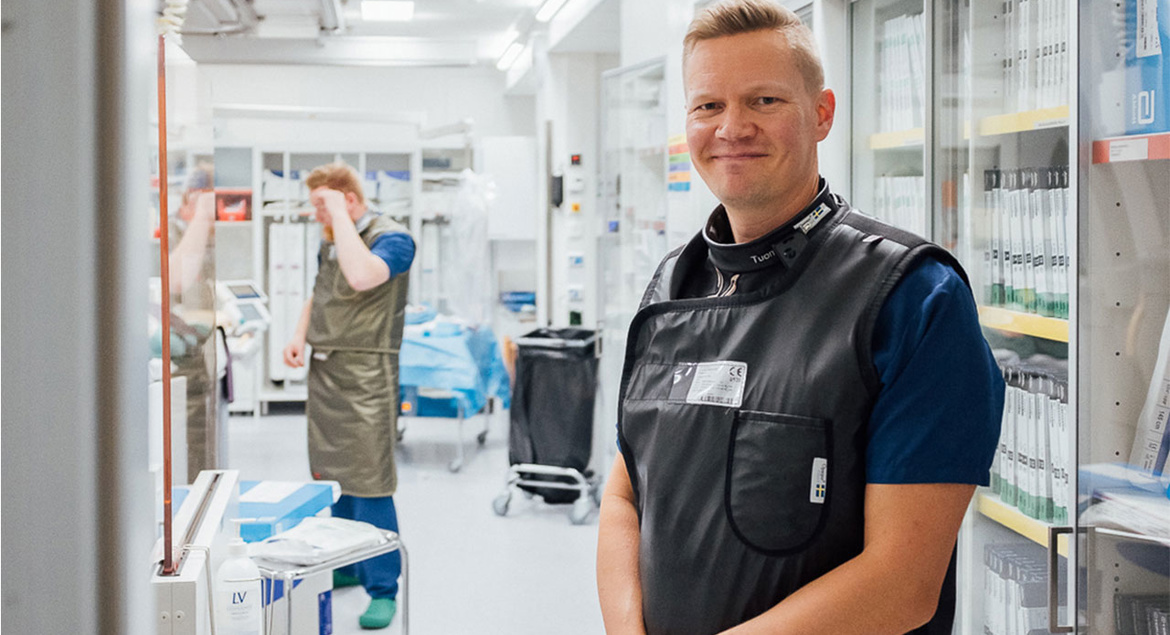When a 68-year-old Finnish man’s heart stopped beating during a car ride with his wife, the close proximity to the only regional, non-university hospital in the Nordic region with Extracorporeal Membrane Oxygenation (ECMO) service helped to save him.
In the hospital, the team initiated extracorporeal cardiopulmonary resuscitation (eCPR) by cannulating the patient and connecting Getinge’s Cardiohelp heart-lung support system. The device kept him alive until the acute coronary artery occlusion was opened with a stent, and during the 140-kilometer ambulance transport to the Kuopio University Hospital, where he later recovered.
“Without rapid access to the ECMO device, these patients have almost no chance of surviving. One can argue that this man’s life was saved by the close proximity to our ECMO-capable hospital. He wouldn’t have made it without it,” says Dr. Tuomas Rissanen, Chief Physician at the Heart Centre in Joensuu.
Previously, in the Nordics, ECMO capabilities had been limited to university hospitals with cardiothoracic surgery units. However, this changed in 2020 when the North Karelia Central Hospital in Joensuu became the first in the region to use ECMO without having cardiothoracic surgeons in their hospital. To make this possible, Tuomas Rissanen’s team (cardiologist, anesthesiologist, and cath lab nurses) is connecting the patient to the ECMO device in a standard cardiac cath lab.
“During these two years, we have proved that this is a robust and reliable setup. All the protocols and equipment are in place for ensuring that the population in our region has access to this life-saving treatment,” Tuomas says.
He continues: “With ECMO limited to the university hospitals, half of the Finnish population would be out of reach. If our setup is established in other hospitals, the coverage will grow considerably.”
The case involving the 68-old man with cardiac arrest is a typical example of how the approach in Eastern Finland works.
The man’s wife called emergency services, who arrived at the scene and performed cardiopulmonary resuscitation (CPR). The team switched to an automated CPR device and then the patient was rushed to the North Karelia Central Hospital in Joensuu, Finland.
“When he arrived, we examined the patient to determine if he could be saved. There has to be a good prognosis for survival before we start the ECMO treatment. Unfortunately, there are also cases that are beyond help,” Tuomas explains.
The patient was connected to the ECMO device, which maintained heart and lung support during the 140-kilometer ambulance transport to the Kuopio University Hospital, where more specialized care could be provided.
After the patient was weaned from Cardiohelp, he was transferred back to Joensuu to complete recovery and eventually he returned to normal life with no significant impairment. This is amazing considering the total cardiac arrest time of 81 minutes.
“The portable, easy-to-use ECMO device is buying us time to treat the underlying cause of cardiac arrest and the patients are then transferred to a hospital with more resources than we can provide ourselves. Even the ambulance we use has been designed for transporting these patients. So far, three cardiac arrest patients have survived with the help of the eCPR program” Tuomas says.
“There was a lot of debate here in Finland before we got a green light for establishing our ECMO therapy. The key to success has been to have a firm protocol in place, train the cath lab staff to become an efficient team and run continuous simulations together with the paramedic team,” Tuomas says.
“We know that our setup and track record may pave the way for other regional hospitals in Finland and maybe also abroad. This would help healthcare systems to save more lives, especially in suburban areas with long distances to a university hospital,” he concludes.
